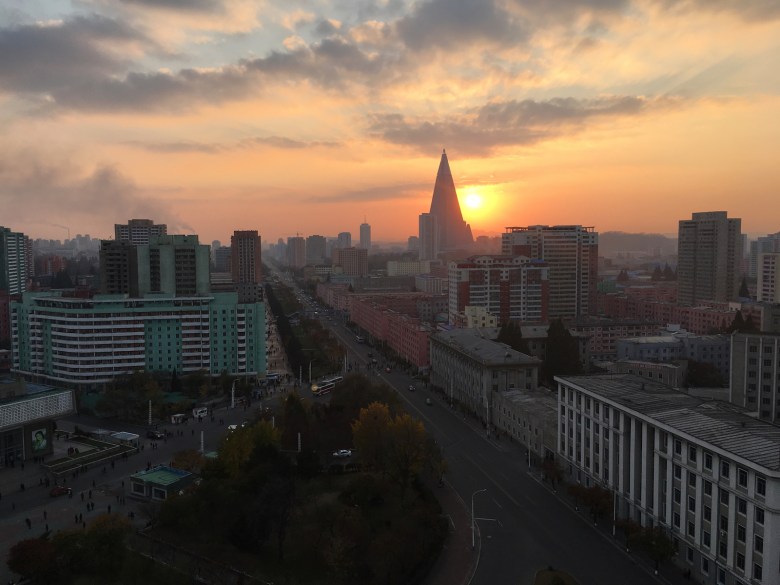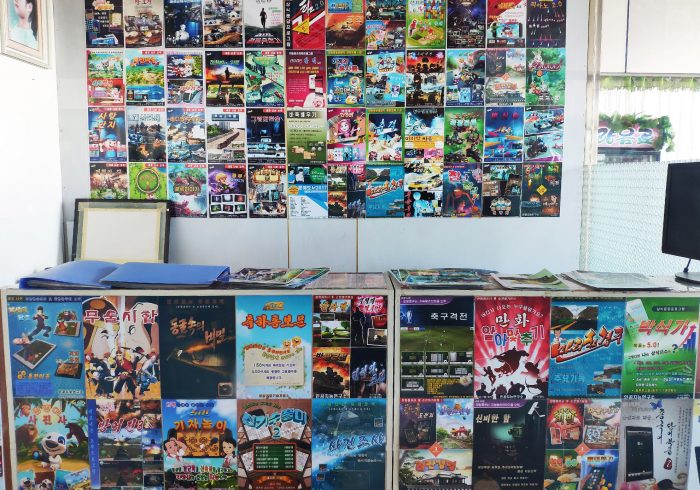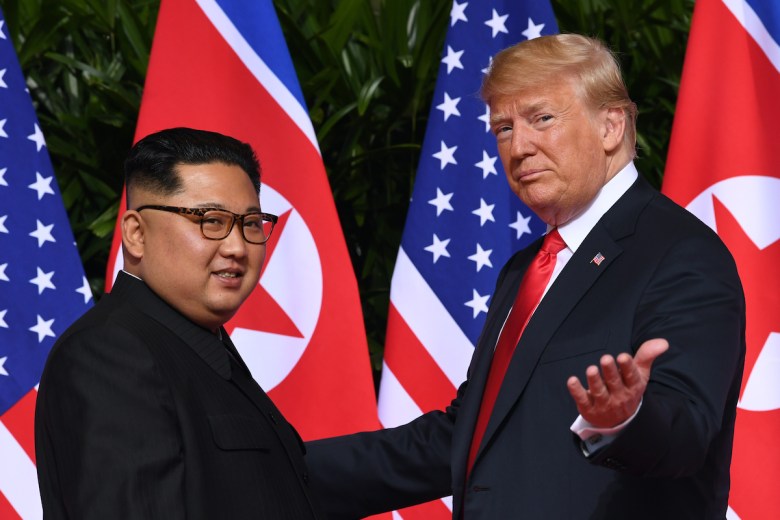For many around the world, North Korea is a fearsome and fiendish dictatorship – a place best avoided.
But for a rare few, it exerts a magnetic fascination.
Add the spice of a secretive, nuclear-armed state led by leader who is a stand-in for a 007 villain, season with the flavor of the forbidden and populate with an oddly charming populace, and you can understand a certain enchantment.
Globe-trotting academic Andray Abrahamian gets it.
The 43-year-old Anglo-American has made 31 trips to North Korea over the last decade, largely as a consultant with Singapore-based NGO Chosun Exchange, which teaches business skills to North Koreans. He has also hosted North Koreans in seminars in China, Singapore and Vietnam.
This decade-long engagement formed the basis for his forthcoming book, Being in North Korea.
In a field dominated by grim defector memoirs and dense geopolitical analyses, what sets the new work apart?
“I have tried to incorporate a bit of levity and humor into what is essentially a very serious and dark subject,” he said in Seoul last week. “If you don’t maintain a sense of irony, the tragedy of the situation can sometimes be overwhelming.”

Being there
North Korea’s combination of menace and charm generates experiences that merge peril with absurdity.
On a trip on the country’s northeast, Abrahamian decided to take a morning run in the hills behind his hotel. He was repeatedly advised by the hotel receptionist that running along the coast was be a better option.
“I was too stupid to realize that she was telling me, ‘Don’t run in the hills,’” he said.
In the hills, Abrahamian found himself facing “the wrong end of a bayonet, attached to a rifle, held by a young soldier who was very scrawny and very badly clothed, barking at me in English, ‘Stop.’”
The tension was defused by a superior officer, but as Abrahamian swiftly departed, he heard the youngster yell after him, ”Let’s be friends forever.”
“You have to laugh at this adorable idea that this person he would never see again could be his friend,” Abrahamian mused. “The absurdity made me cackle but seconds later, the pathos was also apparent.”
Contrary to simplistic misconceptions that North Koreans are brainwashed, single-minded regime robots, a spectrum of opinion exists.
“I have met everyone from absolute true believers who are really invested and committed to the system to a couple of people who are extremely cynical, so cynical they express it a foreigner,” Abrahamian explained. “One said, ‘We know we are doing capitalism here.’”
And aspirations can be voiced. “One person mentioned in Beijing, ‘Look at this. Nobody could imagine this could be such an international city. I hope one day Pyongyang will also be like this,” he recalled.
Odd allure
The charm of being in North Korea is partly the lure of the forbidden.
“There is a mystery to it and a feeling that if you understand it, you have cracked something most people don’t get to crack,” Abrahamian said.
This factor makes human interaction more intense.
“If you make a connection and find you have something in common – someone who is into Greek mythology, say, or into military planes – that connection seems so much more valuable if you made it with a North Korean.”
Partly it is the charm of the people. “You can get really attached to the people you know there,” he said.
Despite a widespread prudishness, ribald jokes are rife, guards are customarily dropped in the bar or karaoke lounge and informal relationships are essential.
“You have to drink with their team, so make sure there is someone [on your team] who can do shots,” he advised. “Personal connections are always important and booze unlocks something in the Korean soul.”
Moreover, the words “North” and “Korea” grab attention back home.
“It makes you interesting to the outside world,” Abrahamian confessed. “I have met a lot of important and fascinating people as I have done something a bit weird. That can be intoxicating.”

Business practices
In a nation strewn with the wreckage of foreign partners and investors – from Rolex and European investment banks to South Korea’s Hyundai Asan and Egypt’s telco Orascom – Abrahamian does not counsel investment by most players.
“The only businesspeople who do OK are Chinese investors as they are more familiar with a system built on vaguery and relations and corruption,” Abrahamian said.
Chinese are active in sectors including trade, retail, manufacturing and resource extraction. However, they maintain a low profile and are not blue-chip.
“They are no major players like big Chinese companies that have too much exposure to markets around the world,” Abrahamian said. “They tend to be small and mid-sized businesses that are less risk-averse.”
In such an opaque society, prying is inadvisable.
“It’s not the kind of place where a lot of asking questions is encouraged,” Abrahamian said. “If you meet a foreigner in a hotel lobby and say, ‘What are you doing?’ and he says, ‘Business’ you know enough not to keep asking.”
Contrary to external belief, there have been changes in economic policies.
After the collapse of the socialist distribution system in the 1990s, marketization spread nationwide. More recently, donju (“money masters”) who made their money in trade, have been investing in a nascent manufacturing base for domestic consumer goods and well as in public-private partnerships. Management has become more results-centric, and more private ownership of output has been permitted.
Chosun Exchange has seen rising interest in design and differentiation. “Products on supermarket shelves are now trying to stand out, trying to look different,” he said.
There is a growing awareness of foreign cachet. One person was making handbags to sell in North Korea but wanted to make them look as if they were Hong Kong-made.
Another Chosun Exchange student decided to open a convenience store. “This person had been abroad and saw that a shop could be open from seven in morning to 11 at night.”
Currently, however, there is pushback.
“In the first few years of this work, I saw a lot of changes that really unleashed business creativity,” he said. “I think, unfortunately, in the last couple of years these have been clawed back and been centralized, controlled and limited again.”
This is likely due to the failure of the Kim Jong Un-Donald Trump summit in Hanoi in 2019 to deliver a result, strengthening the voices of those favoring control.
Yet attitudinal change looks irreversible.
“Young people never knew the command economy where the state provided everything and made all work and economic decisions for your family,” Abrahamian said. “Overall, younger people are much more pragmatic and much more hopeful. They can see a version of their country that is a bit more like China.”
Exposure to China is critical, Abrahamian believes, because it shows potential. North Koreans elites wish they lived somewhere where things were not so difficult, he said. “If they were in their position in China or South Korea, they would be incredibly wealthy and would have the world at their fingertips.”
This provides a lever for change. “In the future, that sentiment can be used,” he said.

Good cop or bad cop?
But will North Korea ever open up? Internal mechanisms for and against both exist.
“In the early Kim Jong Un years, there was a lot of positivity about economic policies. He was branded as the ‘life is getting better’ guy. “That is better for him as the more consensus you build in a society, the more robust it is.”
The problem is that consensus is far from essential.
“The North Korean state has the most diverse and penetrating apparatus of oppression in the history of the world,” he said. “So if they fail to deliver on the good times, they can lean on that system for stability.”
With Pyongyang currently chilly toward diplomatic engagement, Abrahamian fears the latter mechanism is in play.
“There are fewer incentives to experiment and take risks, more incentives to catch people out and get other people in trouble to demonstrate loyalty,” he said. “Indeed, if the pie is shrinking, you remove rivals for bits of the pie at all levels.”
Unlike some engagers, who decline to criticize Pyongyang, Abrahamian has retained moral vision. “There is no doubt that is the nastiest of regimes,” he said.
Even so, he insists efforts must be made to ensure better outcomes for the people subject to that regime. So, carrot or stick?
Abrahamian favors the former. “My overall view is we should be nudging them rather than boxing them in completely” he said.
The logical foundation of his belief is the consequence of the almost inevitable failure.
“Let’s face it. Both engagement and pressure have come up short,” he admitted. ‘But if you fail at engagement, what have you done? If you fail at pressure, what are the consequences?’ To me, failures of engagement are more acceptable.”



